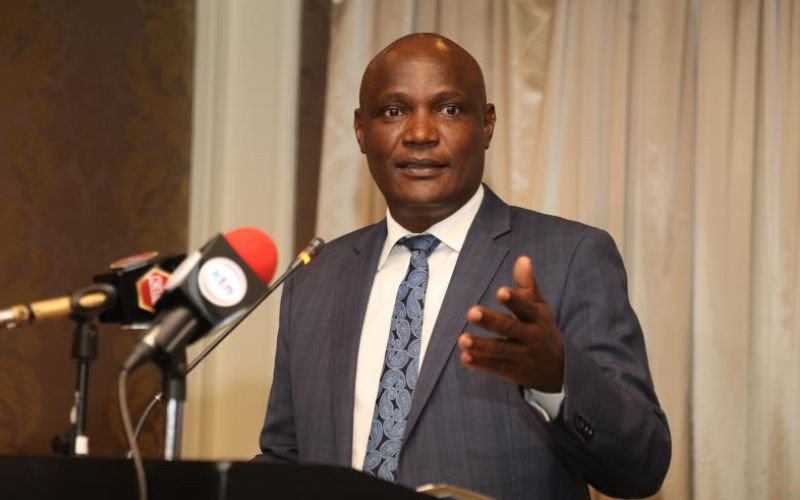
Fourteen years ago, Lucia Mwanzia was living a normal life as a businesswoman, a mother, and a wife. Her husband, who was 54-years-old then, worked in the Kenya Defence Forces. Despite the normal ups and downs, life was generally blissful until one day, her husband developed convulsions. Everything changed from that moment.
“The symptoms had started manifesting about a year earlier when he could forget simple things. Then he started stammering, and we thought it was genetic because some members of his family are stammerers,” she begins.
Lucia says the symptoms worsened when Mwanzia started being withdrawn from the normal, upbeat family conversations. Their young children also noticed the change in their father.
“We would crack a joke, and he would not respond as usual, like a laugh or comment on the joke, or we would talk about something, and he would talk about something opposite to whatever we were talking about. That is when we got worried,” she narrates.
Lucia says sometimes, she would board a matatu with her husband, and he would refuse to alight. According to Lucia, people in public vehicles would be impatient, wondering why a grown man would behave like a child.
“I would be so angry with them. I mean, couldn’t they see that my husband was not okay? I felt so bad, but I have never let anybody mistreat or stigmatise him. I decided from day one to be his weapon and defender,” the mother of four explains.
As the symptoms progressed, Lucia says it was extremely challenging and exhausting for her and her family to take care of Mwanzia, who would sometimes disappear without notifying his family.
“We would frantically look for him everywhere, and then suddenly, people from our church called to tell me that my husband was at church and was looking confused.”
Incurable
Lucia says they had not sought any medical attention despite knowing that her husband was not okay until one day, when the family had just woken up, their younger son raised the alarm after Mwanzia started convulsing.
“He came running to me saying, Daddy anakufa mum! ( Dad is dying, mum!)We rushed him to the hospital, and that is how our journey with Dementia began. My life changed from a businesswoman to a full-time caregiver,” she says.
After several tests at the hospital, Mwanzia was diagnosed with progressive frontotemporal dementia, a condition which, according to their doctor, had no cure.
“--,” she narrates. Lucia says she sought to know more about the condition from the internet, and with time, she became more knowledgeable about dementia.
“With the stigma associated with dementia, it was difficult at first; having to explain to family and friends what I am not even fully knowledgeable about.”
Stay informed. Subscribe to our newsletter
Frontotemporal dementia (FTD) is an umbrella term for a group of brain diseases that mainly affect the frontal and temporal lobes of the brain. These areas of the brain are associated with personality, behaviour, and language. In frontotemporal dementia, parts of these lobes shrink, in a process known as atrophy.
According to the founder of The Brain and Mind Institute at Aga Khan University, Dr Zul Merali, symptoms depend on which part of the brain is affected.
“Some people with frontotemporal dementia have changes in their personalities. They become socially inappropriate and may be impulsive or emotionally indifferent. Others lose the ability to properly use language,” he explains.
Stigma
Dr Zul further explains that Frontotemporal dementia can be misdiagnosed as a mental health condition or as Alzheimer’s disease.
“FTD tends do occur at a younger age than does Alzheimer’s disease. It often begins between the ages of 40 and 65, although it can occur later in life as well. FTD is the cause of dementia about 10% to 20% of the time.”
In many African societies, brain-related conditions are often stigmatised, and sometimes seen as witchcraft.
Mwanzia’s case was not an exception. According to Lucia, she has had to cut off many links over time, even though there are a few family members, like her children and friends, who have held her hand through it all.
“Some family members started blaming me, saying I was trying to kill him to get his money. Others would say that I had bewitched him, and some other friends would tell me to leave him because they thought he was becoming a big burden to me.”
Fourteen years later, Lucia could pass for an expert in nursing. She now handles and fully takes care of Mwanzia, who is now fully dependent on her and the family.
“I do everything that a nurse or doctor would do. I will check on the oxygen levels, blood pressure, you name it. Sometimes, he would eat and choke because of aspirated pneumonia- a case where food goes to the lungs, and he aspirates. At some point, he was not able to breathe well, and now they had to put a tracheostomy on him to help him breathe,” says.
According to her, although it is challenging, taking care of her husband while he is immobile is much easier than when he would disappear and get lost.
“The journey has not been easy. We have seen him talk and stop talking. We have seen him move from eating on his own, and now he cannot eat. Instead, he depends on a feeding pipe. He also has to use diapers. It has been a progressive deterioration of his health,” she confesses.
According to the World Health Organization, currently, more than 55 million people have dementia worldwide, over 60% of whom live in low-and middle-income countries. Every year, there are nearly 10 million new cases.
In 2019, dementia costed economies US$ 1.3 trillion globally. Approximately 50% of these costs are attributable to care provided by informal caregivers - like family members and close friends - who provide on average 5 hours of care and supervision per day.
In Mwanzia’s case, his wife, Lucia, says she is glad they have medical cover from his former employer (Kenya Defense Forces), despite it not being sufficient.
“We get hospital admissions about two to three times a year, and one night alone could cost half a million, depending on how serious his condition is.
There was a time when the medical cover got depleted in June, and I was really worried, but because of my faith in God, we did not get any hospital admissions in the remaining months,” she says.
Financial exploitation
Apart from the normal costs, Lucia admits that some hospitals take advantage of her husband’s condition to exploit them financially
“I usually have to stay with him in the hospital, and they will charge an extra 2500 per night for just being there for my husband and sitting on a plastic chair. They do not offer any food or drinks.”
When she is not able to be at the hospital, Lucia says the hospitals will still insist that she has to pay for a caregiver.
We also experience stigma at the hospital where some nurses refuse to take care of the patient, and the hospital asks us to pay for a caregiver in cash. Lucia has also had to deal with cases of negligence by some medics in hospitals making her incur extra costs.
“For instance, we are now nursing a bed sore that could have been avoided. We have to pay a nurse to come here about three times a week to treat the wound, and we don’t know when it will heal,” she laments.
If they did not have medical cover, Lucia says it would have cost the family more than Sh2 million per year for medication and hospital visits alone. Other recurrent expenses like diapers, food and supplements, which the patient has to take after blending, and other costs could raise the figure to about Sh3 million annually.
With all these expenses to think of, and a husband to take care of almost fulltime, Lucia often feels the stress and suffers burnout from time to time, but over time, she has learned when to take a break.
“I will take a walk and have coffee, then be back in the evening. When it is so much, I have a day off every week where I can go to church or visit my friends who have been so supportive.”
Sometimes her children get a nurse who will sit in for her for a week or two, “which is also expensive. But once in a while, we have to do it so that I can energise and refuel to remain sane and be able to continue taking care of my husband,” she says.
Lucia’s message to other caregivers is that it is not easy, but it will always be worth it.
“Stay strong and just make sure that you love them, and then you understand them, and then you support them with all you have.”
According to WHO, Women experience higher disability-adjusted life years and mortality due to dementia but also provide 70% of care hours for people living with dementia. Dr. Zul Merali echoes that women are disproportionately affected by dementia, both directly and indirectly.
“Mostly, you will find that it is the wife or a sister or a daughter taking care of someone living with dementia. This affects the finances of the family because the caregiver has to leave any other form of work to fully focus on the patient.”
Kevin Mwenda, a journalist with China Media Group’s African Bureau in Nairobi, narrates how his wife, Lily, was very instrumental in taking care of his late mother, who suffered from dementia.
“Getting a dedicated caregiver is never easy. It takes a lot of courage to take care of a person with dementia, and if my wife was not there to take of my mother, I don’t know how I would have managed.”
According to Mwenda, the patient may not live long if they are not well taken care of. He adds that her being there gave him a lot of peace because he knew she would be well taken care of.
“Before we decided to move in with her in 2020, my mother had a series of Urinary Tract Infections (UTIs) because of lack of proper hygiene. The diaper was not being changed on time, and this caused the breeding of bacteria.”
Support group
To understand the condition better, he joined a group called the Alzheimers and Dementia Association, where he met many people who are caregivers to people living with dementia.
“I found an amazing community there. Since it’s a progressive condition, I shared notes with people who were where we had not reached yet.
According to Dr. Zul, there is a huge disparity between the West and African countries when it comes to addressing dementia and associated illnesses.






